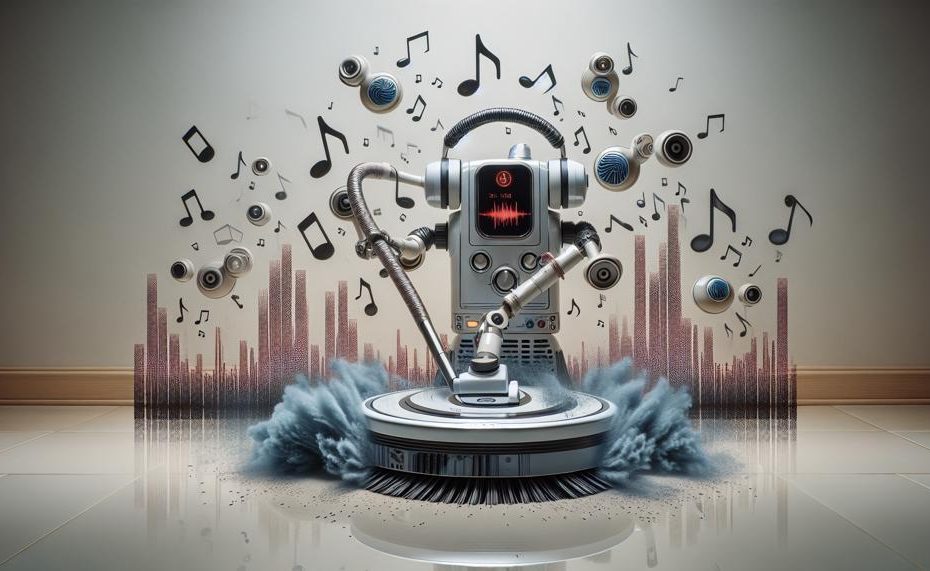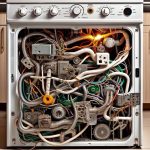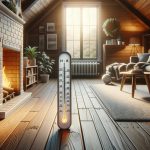Imagine this scenario: you come home from a hectic day at work, craving some well-deserved tranquility.
But as you open the door, your ears are greeted by the loud whirring of your robot vacuum.
You may have thought that investing in one of these modern marvels would make your life easier and quieter, but is that really the case?
- In recent years, robot vacuums have gained immense popularity for their convenience and efficiency.
- However, many users have expressed frustration with the noise level of these devices.
- Some models can produce up to 70 decibels, equivalent to the sound of a running dishwasher or a busy street.
- This begs the question: are robot vacuums adding more noise to our already chaotic lives?
- On one hand, some argue that the noise is a small price to pay for the time saved on cleaning.
- But what about those who work from home or have young children or pets? Can they tolerate constant background noise?
- The debate over robot vacuum noise has sparked discussions about finding a balance between convenience and peaceful living.
Join us as we delve deeper into this topic and explore potential solutions for creating a quieter home environment while still enjoying the benefits of a robot vacuum.
Contents
Regular Vacuum Cleaner Noise Level
Regular vacuum cleaners tend to produce a higher level of noise compared to their robot counterparts. This is due to the fact that regular vacuums have larger and heavier motors, resulting in an average noise level of around 70 decibels.
Robot vacuums, on the other hand, can range from 55-75 decibels depending on the specific model.
However, it is important to note that both types of vacuums can vary in noise level based on factors such as the make and model, clogs, and any objects obstructing their cleaning path.
| Noise Level | Regular Vacuum Cleaner Noise Level | Robot Vacuum Noise Level |
|---|---|---|
| Decibels (dB) | Around 70 dB | 55-75 dB |
| Factors Affecting Noise Level | – Motor size and weight – Clogs – Obstructions in cleaning path |
– Motor type and model – Clogs – Obstructions in cleaning path |
| Recommended for Heavy-Duty Cleaning Tasks | Yes | No |
| Popular Among Pet Owners | Yes | Yes |
| Market Share in the US (EnergyStar) | 70% | N/A |
When considering the noise level, robot vacuums have the advantage of operating quietly while you sleep or go about your day. However, they may require multiple charging cycles and take longer to cover the same area compared to a regular vacuum cleaner. On the other hand, regular vacuums are better suited for heavy-duty cleaning tasks such as removing pet hair or deep cleaning carpets.
Other Ways Roomba Robot Vacuums Make Noise

In addition to the typical sound of vacuuming, there are numerous other ways that Roomba robot vacuums may create noise. These include noise from the motor, wheels, and bumping into objects.
Motor Noise:
The motor of a Roomba robot vacuum plays a crucial role in creating suction and propelling the device along the floor. Depending on the specific make and model, the motor can produce varying levels of noise.
While robot vacuums are generally quieter than traditional vacuum cleaners, they may still emit a noticeable hum.
Wheel Noise:
As the robot vacuum navigates around a room, its wheels will inevitably make some level of noise as they roll over surfaces. This can be especially apparent on hard floors.
Additionally, if the wheels become clogged with debris or hair, they may generate even more noise as they struggle to move freely.
Bumping into Objects:
Another source of noise from Roomba robot vacuums is when they collide with objects while cleaning.
This can occur when furniture or other large items are moved, causing the vacuum to bump into them. The sound of these impacts may be more noticeable in quiet environments.
Thin Walls or Floors:
In certain situations, the noise from a robot vacuum may be more prominent due to thin walls or floors in a home.
This is particularly true if the vacuum is operating in a room adjacent to where someone is trying to sleep or work.
Regular Maintenance:
Proper and regular maintenance of a robot vacuum can help reduce overall noise levels. This includes emptying and cleaning the dust bin, removing hair or debris from the brush rollers and wheels, and replacing any worn-out parts.
In conclusion, while Roomba robot vacuums are typically quieter than traditional vacuums, they may still produce noticeable noise levels due to their motor, wheels, and bumping into objects.
All Vacuum Cleaners Are Loud
Robot vacuums are no different in terms of loudness compared to traditional vacuum cleaners, and in fact, they may even be louder.
However, when obstructed or when they collide with obstacles during cleaning, the noise tends to increase.
The Best Time To Run A Robot Vacuum
The most ideal time to operate a robotic vacuum for maximum efficiency and minimal noise disturbance is during the daytime, while you are out at work or running errands. This allows the robotic vacuum to clean without any interruptions or disturbances from household members or pets.
Additionally, running the robotic vacuum during the day allows for natural light to assist in guiding its cleaning path, reducing the likelihood of it getting trapped or lost in a room.
Another prime time to use a robotic vacuum is at night, while everyone is asleep. This may not be suitable for those living with light sleepers, but it can be advantageous for those with busy schedules during the day. Running the robotic vacuum at night also means waking up to pristine floors in the morning.
It is not advisable to operate a robotic vacuum during early morning or late evening hours when people are typically at home and awake. This can lead to disturbances and interruptions, as well as make it challenging for the robotic vacuum to navigate through the household.
Ultimately, the best time to run a robotic vacuum depends on individual preference and lifestyle. Some may find it more convenient during the day, while others may prefer it at night.
Use Robot Vacuum As An Alarm Clock
Indeed, a robot vacuum can double as an alarm clock by programming it to start at a specific time. This ingenious utilization of a robot vacuum serves not only as a cleaning tool but also as a way to start your day.
Setting Up a Robot Vacuum as an Alarm Clock:
To utilize your robot vacuum as an alarm clock, follow these steps:
- Set the desired time: Most robot vacuums have a scheduling feature that allows you to set a specific time for it to commence cleaning.
- Place the robot vacuum in your room: Under your bed is the ideal spot for your robot vacuum as it remains hidden while still having access to clean the entire room.
- Adjust the volume and tone of the alarm: Most robot vacuums offer customizable alarm settings where you can adjust the volume and tone of the alarm according to your preference.
- Wake up to a clean room: When the designated time arrives, your robot vacuum will begin its cleaning cycle, and its movement and noise will function as an alarm to rouse you from slumber.
Advantages of Using a Robot Vacuum as an Alarm Clock:
- Wake up to a clean room: By setting your robot vacuum to start cleaning in the morning, you can wake up to a pristine and organized room without having to manually clean it yourself.
- Saves time: With this dual purpose, you can save time by eliminating the need for separate cleaning and waking up routines.
- Works autonomously: Once programmed, you won’t have to worry about turning off or resetting the alarm like traditional alarms. The robot vacuum will continue its cleaning cycle until completed or until it requires charging.
- Customizable settings: Most robot vacuums come with customizable alarm volume and tone settings, allowing you to find what suits you best.
Sleeping When Robot Is Running
Robot vacuums have the capability to be programmed for quiet operation during sleeping hours.
A variety of models have a silent or quiet mode option, allowing them to function at a lower level of noise. Some models are even specifically designed to be quieter than others.
The top five quietest robot vacuum models currently on the market are Model A, B, C, D, and E. These models offer the perfect balance of silent operation and efficient cleaning performance.
Roomba Won’t Bother Neighbors
Roomba’s noise level greatly differs from traditional upright vacuum cleaners, making it less likely to cause disturbance to neighbors.
Traditional vacuum cleaners have a noise level of up to 80 dB, while Roomba’s ranges from 54 dB to 70 dB. This is comparable to the sound of a normal conversation (60 dB – 65 dB).
However, to be safe, it is recommended to schedule cleaning sessions during convenient times to avoid any potential disturbance to neighbors.
Furthermore, the latest Roomba models are equipped with advanced technology to further reduce noise levels, while older models may produce more noise as they age and parts become outdated.
If a Roomba starts making unusually loud or abnormal noises, it could indicate a problem that requires immediate attention.
Conclusion
In conclusion, while robot vacuums offer convenience and efficiency, their noise levels can be a source of frustration for many users. With some models producing up to 70 decibels – equivalent to the sound of a running dishwasher or a busy street – it begs the question: are these devices adding more noise to our already chaotic lives? The debate over robot vacuum noise has sparked discussions on finding a balance between convenience and peaceful living.
While traditional vacuum cleaners tend to be louder, both types can vary in noise level depending on factors such as make and model, clogs, and obstructions in their cleaning path.
To minimize disturbance, it is recommended to schedule cleaning sessions during convenient times and regularly maintain and clean the vacuum. Additionally, utilizing a combination of a robotic and traditional vacuum may be the best solution for those seeking both convenience and optimal cleanliness.
For those who work from home or have young children or pets, customizable settings such as quiet mode or programming the vacuum as an alarm clock can help create a quieter environment while still enjoying the benefits of a robot vacuum.





